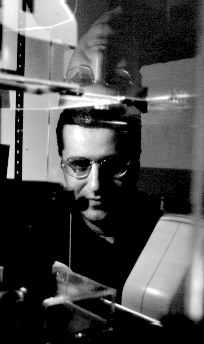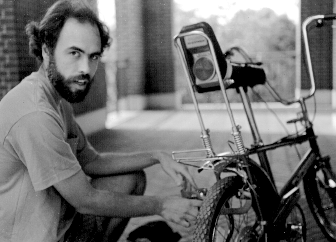
 Plugging "glue" in sticky
cells
Plugging "glue" in sticky
cells
Platelets, the blood cells that help a cut finger stop bleeding,
can also take a deadly turn as they course through veins and
arteries. When platelets in the bloodstream clump together as a
clot, they can trigger a heart attack or a stroke. When platelets
stick to a moving cancer cell, they may hide it from the body's
natural defenses.
A Hopkins scientist is working on ways to
disable platelets' unhealthy habits while preserving their
ability to halt blood loss. The goal, says Konstantinos
Konstantopoulos, is to unlock the secrets of the tacky molecules
that platelets use to cling to each other and to the walls of
blood vessels.
Full story...
 Student delivers "recycling"
message
Student delivers "recycling"
message
Two or three days a week, you will find Greg Downey deep inside
the Smithsonian Institution in Washington, D.C., poring over
thousands of turn-of-the-century documents to look for clues
about the old Western Union bicycle messenger boys.
In the "information age" spawned by the spread
of the telegraph in the second half of the 19th century, the
telegraph messenger boys were the foot soldiers that made the
system work, aided by the bicycle. For more than 40 years,
thousands of messengers--simply called "boys" back then because
males between 12 and 14 years old were considered ideal for the
job--delivered the e-mail of that era.
Full story...
| [ The Gazette | Search | About the Gazette | Send us Email ] |
The Gazette
 The Johns Hopkins University
The Johns Hopkins University
 Suite 100
Suite 100

3003 North Charles Street
 Baltimore, Maryland 21218
Baltimore, Maryland 21218
 (410) 516-8514
(410) 516-8514  gazette@resource.ca.jhu.edu.
gazette@resource.ca.jhu.edu.
